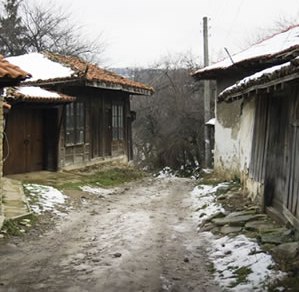How easy is it to write about Bulgaria in a work of fiction? Having lived in Bulgaria for two years I am attempting to give an accurate picture of the country in my writing. Recently I posted a review of Cold Snap, a collection of short stories set in a fictitious village some 60 kilometers east of Sofia. The book was written by Cynthia Morrison Phoel, who served in Bulgaria as a Peace Corps volunteer.
I interviewed Cynthia to get some background about her successful efforts to write about Bulgaria.
ES: You served in the Peace Corps in Bulgaria in the 1990s. Did you do any creative writing at that time?
CP: No. I did keep journals, which I have yet to harvest. And I wrote lots of letters to my then-boyfriend, now-husband. But I was pretty busy with my teaching and a few side projects. Creative writing was really pretty far from my mind.
ES: When did you start working on the short stories in Cold Snap?
CP: In 2001. I was a student in the Warren Wilson MFA Program for Writers. Prior to Warren Wilson, I spent about four years in classes and workshops writing a lot of really terrible stories.
ES: Have you revisited Bulgaria since your Peace Corps service?
CP: I'm sorry to say I haven't been back since 1999. So, I counted on some dear Bulgarian friends to read my stories, fix my grammar, and corroborate that what I was writing was an accurate reflection of Bulgaria in the early post-Communist years.
ES: Your fiction deals with Bulgarians and their daily lives and struggles. What made you decide to focus on their stories, and not write about Americans/foreigners visiting and experiencing life in Bulgaria?
CP: Writing from the Bulgarian point of view was one of the most important decisions I made for my writing. For years, I wrote about young American women going to live in Bulgaria, and the stories were flat and uninteresting. Then, at Warren Wilson, where I was having to write much more quickly, I decided to try writing a story from the point of view of a Bulgarian boy. This felt like an audacious choice: my entire time in Bulgaria, I was aware that no matter how well I acclimated to Bulgaria, I would never be Bulgarian or own that perspective. But for my writing, this choice was wonderful. That story, "A Good Boy" in the collection, wrote itself and became my first published story. I found that writing from a Bulgarian point of view made it possible for me to really fictionalize--and to finally write some good fiction.
ES: What do your Bulgarian friends think about your stories?
CP: I think my Bulgarian friends agree my stories are true. Some of my friends, especially my older friends, tell me it's kind of sad to read about this time. Other friends are grateful that someone has documented this time in a vivid and accurate way.
ES: While you consistently translated Mother and Father into “Maika” and “Tatko”, you never translated Old Mountain, the name of the town where the stories took place. Why was that?
CP: That's a good question. I guess that, on some level, using "Maika" and "Tatko" felt essential to me. These are everyday words, and for me, it would have felt unnatural to use English. I worked pretty hard to make sure the English-language reader would understand their meaning.
With Old Mountain, I really like the English translation. "Stara Planina" would have meant nothing to the English-language reader. There are some kind of Bulgarian insider choices I made--like naming my main character "Dobrin" in "A Good Boy"--but because the Stara Planina is the backdrop for the whole collection, I think something would have been lost had I used the Bulgarian instead of English.
ES: The stories of Cold Snap are interlinked with each other. Why did you choose to present them as individual stories, and not as a novel with alternating story lines?
CP: The stories were largely written in the order in which they appear, and many of them were published as they were written. Each story was a pretty polished, finished piece by the time I came up with the idea of linking the collection. I would have had to undo a lot to make this into a novel and possibly lose some of what makes these pieces really work as stories.
ES: What’s next for you? More stories about Bulgaria?
CP: I'm currently working on a novel. With this piece, I've moved off Bulgarian soil, but I still have Bulgaria very much on my mind.
The image is from Cynthia Morrison Phoel’s website.

No comments:
Post a Comment